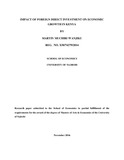| dc.description.abstract | Different scholars hold different opinions as to the exact contribution of Foreign Direct Investments in the economic growth discourse of many developing countries. Proponents believe FDI augments domestic capital and enhances productivity and growth through filling of the savings; foreign exchange; revenue; and management gaps in addition to promoting credit and risk sharing across borders;technology and skills transfer; employment creation. Opponents believe that FDI expose domestic markets to external volatility; increase dependency, and crowds out domestic savings thus undermines macro-economic stability.
The Government of Kenya places a high premium on the contribution of inwards FDI towards economic growth as evidenced in various deliberate interventions it has initiated to harness FDI inflows into the economy including legislation and incentive marketing. Yet, previous studies on the real contribution of FDI on economic growth or conditions under which FDI boosts economic growth have yielded mixed results. Given the level of importance accorded to in-bound FDI to Kenya’s economic growth, this study set to analyze the impact of FDI on economic growth in Kenya using time series from 1980 to 2015. Ordinary Least Square (OLS) method was used to estimate the impact of FDI and other variables on real GDP of Kenya.
The key finding is that 73.84 percent of the variation in Kenya's economic growth over the period is explained by level of infrastructure and human capacity development, FDI, Gross Fixed Capital Formation, Inflation, Financial Development, labour stock, openness of the economy and interactions between FDI and complementary conditions. By itself, however, FDI is not insignificant in influencing economic growth in Kenya but must interact with infrastructure development and openness of the economy to yield the desired impact on economic growth. Accordingly, for the economy to realize its medium terna and long term aspirations, whose success the government has pegged on the inbound FDI, these conditions need to be availed or harnessed. | en_US |



